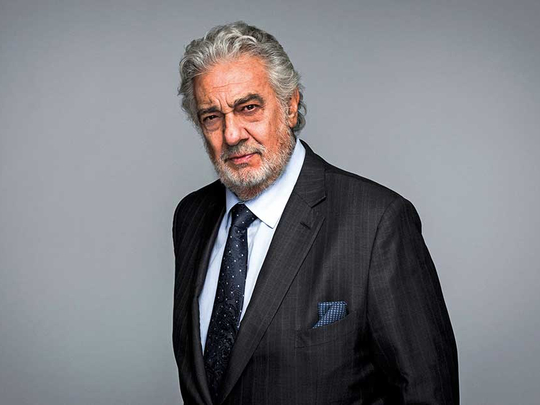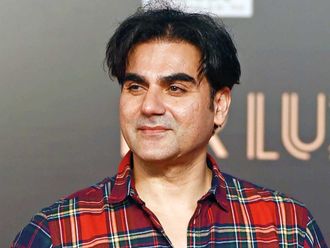
The great tenor Enrico Caruso sang about 60 roles; the storied diva Maria Callas, roughly 50. Renee Fleming, the most famous soprano today, says she has sung about 55.
But Placido Domingo has blazed past them all. When he takes the stage for a concert performance of Bizet’s The Pearl Fishers at the Salzburg Festival in Austria, Domingo will reach a virtually unheard-of milestone in opera history: He will sing his 150th role.
“If you look at the history of singers in opera, he stands by himself,”Joseph Volpe, the former general manager of the Metropolitan Opera, said. “If there was ever a giant in any industry, it’s Placido Domingo. He’s unmatched.”
Now 77, well past the age at which most star singers retire, Domingo has performed nearly 4,000 times in a six-decade career, recorded more than 100 albums, and become a household name as one of the Three Tenors and in appearances on Sesame Street and The Simpsons.
And he has continued to add voraciously to his repertoire, choosing roles to match his changing voice, while also becoming a prominent conductor and arts administrator. It’s as if Tom Brady were still winning Super Bowls in his 50s while playing three sports at once.
Domingo’s resilience has had its detractors. As early as the 1970s, he was told to slow down or risk burnout. (In a 1972 New York Times Magazine profile, Callas told him, ‘You’re singing too much.) As he entered his 60s, then his 70s, critics and peers repeatedly suggested he should retire with dignity.
Nothing has stopped him. “When I rest, I rust,” he said in an email interview, and when his tenor high notes began to give out, he moved down to baritone roles. Domingo’s debut in his 149th role, as the baritone Miller in Verdi’s Luisa Miller at the Met last spring, was sold out — as are most of his performances around the world — and widely praised.
“His voice sounds healthy; he moves with fluency,”Zachary Woolfe wrote in his New York Times review. “If he’ll never be a true Verdi baritone, and always an aging tenor in baritone’s clothing, it is still a display not to be missed: someone of Mr Domingo’s stage of life taking on a new Verdi role at a great opera house and doing himself no small degree of honour with it. You almost don’t believe your eyes or ears.”
Peter Gelb, the Met’s current general manager, said that Domingo’s recent appearances with the company have shown that people haven’t lost their appetite for his performances.
“He’s a legend,”Gelb said. “If you’re a baseball fan, who wouldn’t want to see Babe Ruth in the final years of his career? And, like Babe Ruth, Domingo has delivered.”
Domingo, who was born in Spain but moved to Mexico with his zarzuela-singing parents as a young boy, swiftly rose to fame after what he considers his debut, in Verdi’s Rigoletto, in Mexico City in 1959. Within a decade, he arrived at the Met unexpectedly, filling in for an ailing Franco Corelli in Cilea’s Adriana Lecouvreur alongside Renata Tebaldi.
“As that performance went on,” said Volpe, who was a carpenter at the Met that night 50 years ago, “everybody realised that this was history in the making, no question.”
From there, Domingo deftly navigated new roles across diverse operatic styles, from Wagnerian weight to bel canto lightness. Among his signatures was Verdi’s Otello; Fleming, who sang Desdemona with him in the 1990s, said that even when she was supposed to be playing dead onstage, her “tears were running” at the beauty of his voice.
The public came to know him as one of the Three Tenors, along with Luciano Pavarotti and Josa Carreras. Their first album together is one of the best-selling classical records of all time. Children saw him on Sesame Street, which had a singing bird character named Placido Flamingo.
Domingo became an opera company’s rarely realised dream: an effortlessly bankable star. Volpe recalled that while he ran the Met from 1990 until 2006 it wasn’t unusual for full subscription series to sell out on the strength of Domingo’s presence. (That he continues to sell out the nearly 4,000-seat house is a fact that Gelb said Domingo makes no secret of.)
Helga Rabl-Stadler, the president of the Salzburg Festival, said she had no hesitation about inviting Domingo this summer for his debut as Zurga in The Pearl Fishers,an opera he has already both sung in (as Nadir, a tenor role) and conducted. He is a bit too old for the character, but Rabl-Stadler said that “he is such a handsome man, you never think about his age; he’s so seductive onstage.”
Domingo said he has spent his summer preparing for the role, as well as for his recent conducting debut at the Bayreuth Festival in Germany, where he received largely negative reviews for Wagner’s Die Walk. In learning Zurga, he played the opera alone at the piano until he had it in his head.
“I can tell you that it’s much harder to memorize text and music now than it was 30 or 40 or 50 years ago,” he said. “But I won’t let that stop me.”
Only after internalising the score does he begin to sing in earnest. This, he said, has helped throughout his career to conserve his voice and energy. (Other habits, he added, include nothing out of the ordinary: sleep, only occasional alcohol and a balanced diet without too many sweets, which he loves.) He also doesn’t talk much the day before a performance. Gelb recalled Domingo sitting in his dressing room, sombre and more nervous than usual, before the Met’s live broadcast of Luisa Millerthis spring. Domingo said he’d been up since 4am, praying the performance would be a success.
In the coming season, he plans to unveil his 151st role, in Manuel Moreno Penella’s El Gato Montes at Los Angeles Opera, where he is general director. He has a new album with the young Spanish guitarist Pablo Sainz Villegas and is scheduled to return to the Met in November as Puccini’s Gianni Schicchi, to celebrate the 50th anniversary of his debut there.
After that, who knows? Opera is an art form often scheduled up to five years in advance, but booking Domingo comes with obvious risks. That is why Gelb keeps the Met’s otherwise taut schedule a little loose for Domingo.
“I will open things up for him, which has meant sometimes changing things around,”Gelb said, adding that Domingo has assured him he will say when it’s time to stop.
Domingo, for his part, still has singing at the centre of his life. “I want to do it,” he said, “as long as I can do it well.”












